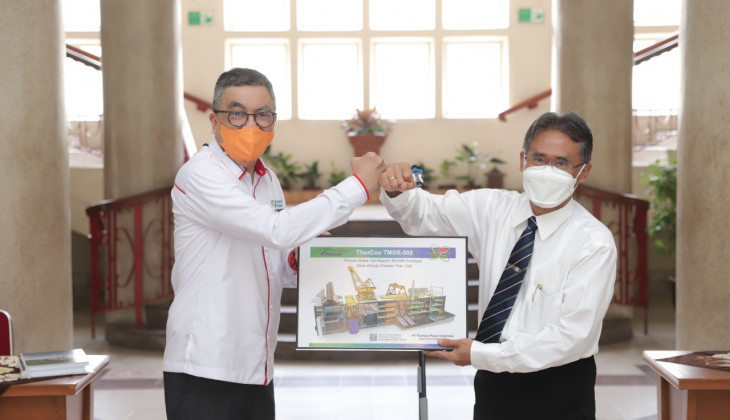UGM collaborates with PT ThorCon Power Indonesia in education, research, and the development of science and technology for thorium-based nuclear power plants.
This collaboration was marked by the signing of a memorandum of understanding by the rector of UGM and the chief operating officer of PT ThorCon Power Indonesia on Friday (15/10) at the UGM Hall.
In his remarks, UGM chancellor Prof. Panut Mulyono welcomed this collaboration to support national energy needs through nuclear power plants.
“With more advanced economic growth, the need for energy is getting more massive, and we cannot fulfill it with the fossil sources we have both in quality and quantity,” explained Panut.
He added that many people still have a negative view of nuclear power plants. In addition, there are concerns from entrepreneurs in related fields that nuclear power plants will replace diesel, coal, and other fuels.
“Each one has its share and can carry out its activities with good arrangements because we also have other power plants such as wind and solar power,” he added.
In addition to developing studies related to the application of nuclear technology, according to him, the two institutions can provide education to the public about the safety of this technology and its positive impacts, including in the aspect of environmental sustainability, other than fulfilling industrial needs.
“Let’s make sure that nuclear power plants are safe, clean, and have a big impact on Indonesia’s economic growth. We do our research seriously, and we hope that we can be at the forefront,” said the chancellor.
The chief operating officer of PT ThorCon Power Indonesia, Bob Sulaiman, explained that nuclear power plants are necessary to meet emission reduction targets. The collaboration with universities is preparation for developing nuclear power plants in Indonesia, which has been a plan for decades.
“The dream of building a nuclear power plant seems to be in sight because currently, the government sees that the target of achieving net-zero emissions in 2060 is impossible without a nuclear power plant,” he said.
Previously, the company had collaborated with three universities to conduct academic studies, a public acceptance survey, and several technology studies.
“UGM is expected to actively support the implementation of nuclear power plants in Indonesia, especially in terms of design participation. In addition, technical assistance will be provided for consultation on the licensing process,” he explained.



